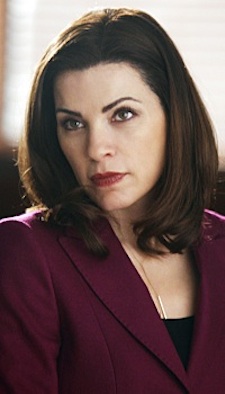Good Wife Boss Shares Secrets To Show's Success, Teases Alicia's Next Move
 Tell the creators of The Good Wife why you think their CBS drama is so great (and now, Golden Globe-nominated), and your choice of words could leave them chagrined. "The word people most often use is 'smart,' which is embarrassing to us," shares Robert King, who created the legal/family/romantic drama with Michelle King, his wife. "The other phrase they use is, 'There's more complexity.'"
Tell the creators of The Good Wife why you think their CBS drama is so great (and now, Golden Globe-nominated), and your choice of words could leave them chagrined. "The word people most often use is 'smart,' which is embarrassing to us," shares Robert King, who created the legal/family/romantic drama with Michelle King, his wife. "The other phrase they use is, 'There's more complexity.'"
King takes the latter compliment as a nod to how deftly the show juggles characters of all stripes -- straight-shooting lawyers, always-angling attorneys, crafty politicians, well-meaning kids and wily investigators.
"People have gotten so used to seeing to many TV bad guys and TV good guys, and CBS is allowing us to explore all these grey areas," he notes.
The Good Wife's other calling cards include a savviness about how today's digital landscape has infiltrated worlds both personal and professional. For example, viral videos and teenagers' tweets have played havoc with Peter Florrick's political campaign, while Kalinda recently used a FourSquare-type app to track down a source.
"One thing we've done is explore issues that the Internet has brought into our lives," King says. "Both positively and negatively."
"The other thing [we're doing] is allowing women to be bad guys -- real bad guys -- in the pursuit of power," King adds.
If it sounds to the initiated as if The Good Wife packs a lot into what may have initially been pegged as a "ripped from the cheating politician headlines" and/or angst-filled "Will They/Won't They?" drama, that is by design.
"The [episodes] that are our favorites are the ones that are trying to do too much," King says of the show's tendency to touch on many bases within an hour. "You want to have as much content as possible that gets people excited to come back after the commercials."
With this week's tense episode come and gone, the Good Wife faithful are facing a longer break, as the TV landscape takes a breather for the holidays. But when Alicia, Peter and Will -- played by Golden Globe nominees Julianna Margulies and Chris Noth, and Josh Charles -- return in early January, you can count on significant movement in TV's trickiest love triangle. After all, Alicia now knows that Will actually did try harder to win her over (at the close of the Season 1 finale), yet thus far she has only taken timid steps - most recently, the suggestion that they find a "moment" to "talk" -- toward feeling him out.
"One of the things we tell ourselves in the writers room is we do plot fast and characters slow," King explains. "Alicia is a responsible woman who finds that she's got the hormonal imbalance of a teenager right now. Will seems to be in a very serious, growing relationship with Tammy (guest star Elisabeth Reaser), so what is she going to do with this new information [about the missed voice message]? She hates that missed connection. She wants to complete that connection. Those are the struggles going on with Alicia -- and they wont go away."

Comments
I would hope that Mr. King really meant that as a writer, he is not misogynistically attacking and denigrating women as "bad", but rather, that he is demonstrating that women as individuals in the corporate/professional environment are equally as capable as men in succumbing to their ambitions (over their personal or professional values). If not, then he, like others in the media reveals his insecurity and fear of women by his mis-characterization of them. The fact is studies have shown that women in such situations by and large perform better than and add an element of honesty, compassion and trustworthiness not found in t heir male counterparts. If King means what he has stated then he but perpetuates the crimes against women in a country in which for 400 years denied women equal opportunity (and still does). Positive, not negative female models are needed. To the extent that "Alicia" represents the wise, intelligent, wronged but morally conflicted, capable modern mother and honest, dedicated, compassionate and equally capable professional with a conscience, she is not just the "good wife", she is the strength and foundation of the show's popularity. Like all foundations, she cannot stand alone and thus the characters of Kalinda, the mother-in-law (past societal and generational values), the conventional, career-obsessed, alpha male Peter, the material vs spiritual conflicted Will, the ambitious, pragmatic but compassionate Diane and other regulars are equally important. The children as depicted are neither as strong nor as credible as the other characters on the show.
I don't think King is mysogynistic. IMHO the show does not present ambitious women as any more evil than ambitious men are. And characters like Alicia and Diane have their flaws but are not the type of negative one note caricatures you often see of career women.But on the other women being bad or bitchy in their pursuit of power is actually done quite frequently. And sometimes its done in an offensive way that implies that women should be less ambitious and leave ambition to men although I don't think The Good Wife does that. But I'm not sure why he's talking as that women being bad in the pursuit of power is a new innovative thing cause it really isn't.